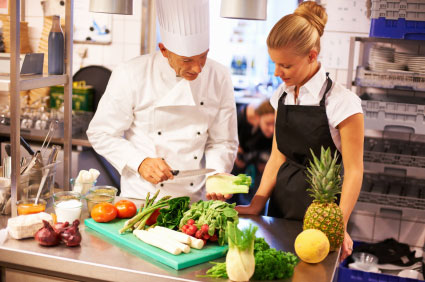
When it comes to food preparation, it’s extremely important to stay clean and healthy to avoid contaminating edible goods with harmful bacteria that could lead to food poisoning. There are many things you can do to make sure health and safety standards are up to scratch including disinfecting the floors and scrubbing all surfaces after use, but here are eight things you should invest in to ensure you stay spic and span.
- Disposable gloves
If you are handling high-risk foods such as pre-cooked meats which can harbour bacteria easily, it’s a good idea to invest in thin latex gloves from the likes of Brosch Direct. These will prevent germs from transferring from your hands to the meat, but be sure to change the gloves regularly to avoid punctures and cross contamination – after all, ‘clean hands are better than dirty gloves.’
- Hand sanitisers
While gloves are required from time to time, they can cause hands to perspire, bringing bacteria to the surface. This can be dangerous if the gloves get a puncture, so whether you use gloves or not, always make sure your hands are sparkling clean by washing them regularly and using hand sanitiser when possible.
- Head covers – hats
No matter what you read about protective clothing in the food industry, you will find that head covers are deemed highly important. This is because hair represents a source of both foreign matter contamination and bacterial contamination and should therefore be covered at all times by a hat under which the hair should be entirely enclosed.
- Hairnets
If you work in the food industry, it’s crucial to follow all food preparation rules and regulations including wearing a hairnet – after all, no one wants to find a stray hair in their sandwich. These handy accessories prevent random strands from floating down into the food you’re preparing and will keep hygiene standards up.
- Beard snoods
Facial hair including beards and moustaches should also be covered during food preparation tasks which is why beard snoods are readily available. These are thin plastic covers which are usually kept in place by a thin piece of elastic and are relatively comfortable to wear.
- Overalls
As everyday clothing can also be contaminated with bacteria, you should also wear protective overalls. While those working in a food preparation factory might be required to wear full jumpsuits that must not be worn off-premises, chefs in restaurants might simply be required to wear a jacket and trouser combination.
- Aprons
Wearing an apron is a simple yet effective way to improve health and safety standards. This is because they help to keep clothes clean and can be easily changed if contaminated by meat drippings, old oil, soil and such like.
- Easy-clean shoes
The aim is to keep your kitchen as germ-free as possible, so buy comfortable, easy-clean shoes and do not wear them outside of the food preparation area.
Cleaning of the kitchen should take place every day, but if you follow the above tips you will also ensure you stay as clean and healthy as possible.
